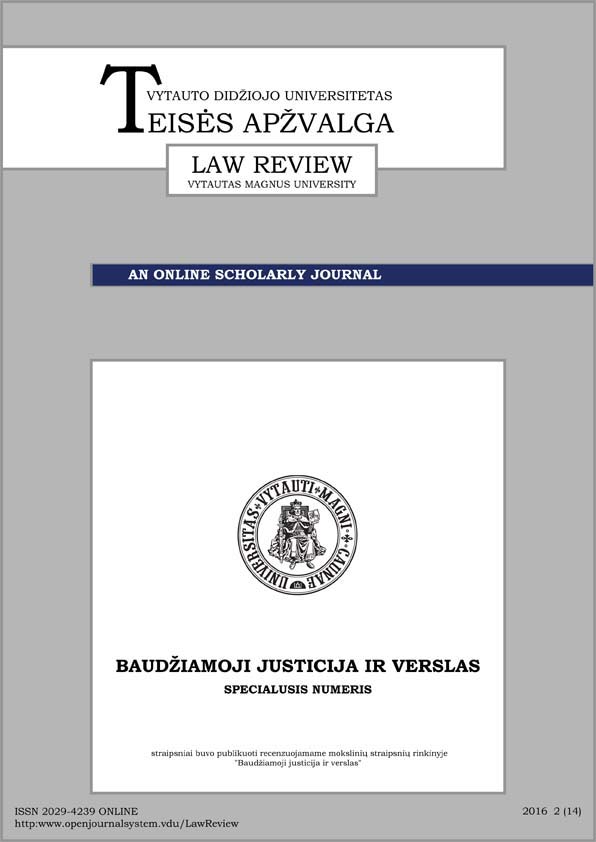Baudžiamoji teisė Europos Sąjungos Teisingumo Teismo prejudicinio sprendimo priėmimo procese
The Criminal Law and the Preliminary Ruling Procedure in the Court of Justice of the European Union
Author(s): Deimilė PrapiestytėSubject(s): Law, Constitution, Jurisprudence, Criminal Law
Published by: Vytauto Didžiojo Universitetas
Keywords: Criminal law; Court of Justice of the European Union; Preliminary ruling; The role of national courts
Summary/Abstract: Straipsnyje analizuojami Europos Sąjungos Teisingumo Teismo jurisdikcijos pokyčiai po Lisabonos sutarties įsigaliojimo prejudicinio sprendimo priėmimo procese, pradėtame gavus nacionalinių teismų nagrinėjant baudžiamąsias bylas pateiktus prašymus išaiškinti Europos Sąjungos teisės aktus ir (ar) pasisakyti dėl jų galiojimo. Taip pat tiriamas nacionalinių teismų vaidmuo šiame procese: teisė ir (ar) pareiga kreiptis dėl prejudicinio sprendimo; reikalavimai procesiniams dokumentams, kuriais prašoma priimti prejudicinį sprendimą; specialiųjų proceso organizavimo priemonių taikymo sąlygos. Aktualios Europos Sąjungos Teisingumo Teismo jurisprudencijos analizė turi padėti atskleisti ir galimas jos raidos tendencijas. The article analyses the changes of jurisdiction of the Court of Justice of the European Union after the coming into force of the Treaty of Lisbon to give preliminary rulings in the proceedings launched where a national court submits a reference for preliminary ruling when considering a criminal matter as well as on a request from a national court to interpret a legal act of the European Union or deliver an opinion on its validity. In addition, it investigates the preliminary ruling, the requirements to fulfil when presenting procedural documents, and conditions of applying special measures in organizing the proceedings. The analysis of the relevant case-law of the Court of Justice of the European Union will also help to reflect the potential trends of its future development.On the basis of the analysis of the case-law of the Court of Justice, the following conclusion is made: after the entry into force of the Treaty of Lisbon and expiry of the transitional period, no restrictions have been left for national courts (irrespective of their position in the national legislative system) to submit a reference for a preliminary ruling before the Court of Justice of the European Union where preliminary questions are related to the area of freedom, security and justice, therefore, the following trend arises: national courts more often decide to use this opportunity of cooperation with the Court also when a criminal case is pending before a national court.In the process of a preliminary ruling the role of a national court is very important, as it, requesting for a preliminary ruling, not only initiates the opening of the process, but also the quality of procedural documents submitted by a referring court may determine the progress, duration and result of the proceedings. Therefore, the requirements and stipulations laid down accordingly in Article 94 of the Rules of Procedure of the Court of Justice and Recommendations to national courts in relation to the initiation of preliminary ruling proceedings are very important.An active use of national courts of a possibility to submit a reference for a preliminary ruling to the Court of Justice in cases where there are doubts as regards interpretation of the European Union legal acts in considering criminal cases and the preliminary rulings of the Court of Justice contributes to the attaining of one of the main objectives laid down in Article 267 of the Treaty on the Functioning of the European Union: to ensure uniform interpretation and application of the European Union law throughout the Union.
Journal: Teisės apžvalga
- Issue Year: 2016
- Issue No: 2(14)
- Page Range: 115-138
- Page Count: 24
- Language: Lithuanian

